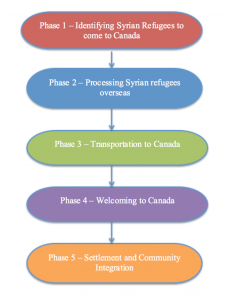The federal government now aims to resettle 25,000 Syrian refugees by the end of February 2016, missing its initial year-end deadline by two months.
According to Health Minister Jane Philpott, chair of a special committee coordinating the government’s Syrian resettlement effort, a minimum of 10,000 Syrian refugees will arrive in Canada by Dec. 31; the remaining 15,000 will follow by the end of February 2016.
Fifteen-thousand refugees will arrive as government-assisted refugees, while 10,000 will arrive through private sponsorship.
Initial target proved too ambitious
John McCallum, the Minister of Immigration, rejected suggestions from reporters that security concerns factored into this decision. “This is a happy day and this is an important day for Canada,” said McCallum. “Yes, we want to bring them fast, but we also want to do it right.”
Minister McCallum and government officials both said the government’s initial year-end deadline was revised to ensure communities in Canada were ready to deal with the influx of refugees, as well as in response to the need to identify refugees for resettlement.
Both also sought to allay security and health concerns. “We will not compromise the quality of the security work that must get done,” said Public Safety Minister Ralph Goodale.
All Syrian refugees will undergo rigorous security and health screening processes. If there are any concerns at any point, the file will be set aside for potential future consideration, said Goodale.
Priorities on eligible refugees remain
To be eligible for resettlement under this program, refugees must be either Syrian nationals or stateless persons who are former residents of Syria.
Canada will only consider Syrians located either in Lebanon, Jordan or Turkey. Refugees must be registered either with the United Nations Refugee Agency (UNHCR) or the Turkish government.
In terms of government-assisted refugees, certain groups will continue to be prioritized as they have been for the past several years. These include:
- Complete families, whatever their composition;
- Women at risk;
- Members of the lesbian, gay, transsexual, bisexual or intersex community;
- Single adult men, if they are identified as a member of the LGTBI community, or if they are accompanying their parents as part of a family.
Officials confirmed while unaccompanied men may still be resettled, they will not be prioritized.
These priorities don’t apply to privately sponsored refugees.
Settlement challenges still to be addressed
Ministers and officials both highlighted the considerable settlement needs that will need to be addressed, including housing and psychosocial supports.
Government officials will be holding a workshop this weekend with settlement service providers and municipalities from across Canada to discuss how to best meet those challenges and what additional resources might be required.
The government has already announced it will spend $678 million over six years toward expediting the resettlement of refugees and supporting their integration in Canadian communities. Between $325 million and $377 million will be directed to support refugee settlement and integration.

